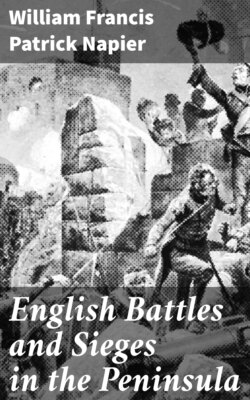Читать книгу English Battles and Sieges in the Peninsula - William Francis Patrick Napier - Страница 37
На сайте Литреса книга снята с продажи.
Second Assault of Christoval. (June, 1811.)
ОглавлениеTable of Contents
Major M‘Geechy commanded the stormers, the forlorn hope, again led by the gallant Dyas, was accompanied by the engineer Hunt, and a little after nine o’clock the leading troops bounded forward, followed by the support, amidst a shattering fire of musketry which killed M‘Geechy, Hunt, and many men upon the glacis. Loudly shouted the British as they jumped into the ditch, but the French scoffingly called them on, and rolling down the barrels of powder and shells made fearful and rapid havoc. A column had been designed for each breach, yet both came together at the main breach, where some confusion about the ladders caused only a few to be reared, and the enemy, standing on the ramparts, bayoneted the foremost assailants, overturned the ladders, and again poured their destructive fire upon the crowd below until one hundred and forty fell and the rest retired.
The castle breach remained for assault, yet the troops could not form between the top and the retrenchments behind the opening unless Christoval was taken, and its guns used to clear the interior of the castle; but to take Christoval required several days; hence, as Soult was ready to advance, the stores were removed and the attack turned into a blockade, the allies having lost four hundred men and officers: the process of siege had been altogether false and irregular.
Marmont now joined Soult, Spencer joined Wellington, and the 19th of June the French armies entered Badajos. The allies were only a few miles off holding both sides of the Caya, a small river flowing between Elvas and Campo Mayor into the Guadiana: yet their disposition was so skilfully concealed by undulating ground and woods, that on the 23rd the French marshals were forced to send out two exploring bodies of cavalry to obtain information. One column cut off a squadron of the 11th Light Dragoons, and the 2nd German Hussars escaped it with difficulty; the other column was checked by the heavy dragoons and Madden’s Portuguese cavalry with a sharp skirmish, in which happened a single combat similar to that between Ariosto’s Rogero and Mandricardo. An English horseman, standing high in his stirrups with raised sword, encountered a French officer who pierced him under the arm; slowly the weapon was driven through his body, yet no shrinking motion could be observed; he seemed only to give more force to his descending weapon, which bit into the Frenchman’s brain and both fell dead together.
Soult and Marmont had above sixty thousand men in line, seven thousand being cavalry, with ninety guns. Wellington had only twenty-eight thousand sabres and bayonets, and the country, a cavalry one, furnished no position to compensate for inferior numbers: a battle gained would certainly have terminated the war. Yet the crisis passed without mischief, because Wellington so concealed his weakness, and outfaced his enemies with such audacity, such a blending of resolution and genius that the French marshals retired and separated without striking! The political and military difficulties supported and overcome by the English general at this period were indeed most extraordinary, and must be sought for in my History of the War, from which this work, treating only of combats, is extracted.
